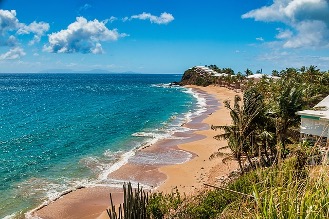When a Second Passport Isn’t Worth the Risk
If you’re thinking about buying a second passport in the Caribbean… there’s a big red flag you need to know about.
There are five Caribbean countries that will give you citizenship and a passport in exchange for investment in a residential property or a donation to the government.
The residential option is the most popular since you get something in return besides the passport.
If you keep the property for five years, you can then sell it to someone else.
Most residential investments involve developers who market gated communities, condos, timeshares, and shares of hotels and resorts to prospective CBI clients…
Funneling CBI clients to these developers is a global network of private agencies under contract to one or more of the governments.

The CBI market should be competitive on quality only, not price.
After all, the required investments are set by the government and aren’t negotiable.
The most attractive countries should get the most applicants. The agencies that provide the best service should get the most business.
But that’s not how things work in practice…
Instead, CBI agencies aggressively compete to offer citizenship for the lowest price.
In Dubai, for example, some CBI agencies offer citizenship for entire families for $70,000 to $130,000 less than the listed price for a single person.
They do this via a practice known as “CBI financing.”
In this scenario, a developer offers a CBI investor a zero-interest loan to cover part of the cost of the residential unit that qualifies them for citizenship.
The bigger the loan, the smaller the cash required up front.
For example, official policy may require the CBI investor to put up $200,000. If the developer gives a loan for $130,000, the applicant only needs to put up $70,000.
Under this arrangement, the developer holds the property as collateral. If the CBI applicant pays off the loan within five years, they get full ownership.
But the developer doesn’t want that to happen. They’d rather the CBI client default on the loan so they can resell the property to someone else in five years…
For many CBI-seekers from places like China and Russia, that’s fine—since all they want is a passport that will get them into the European Union.
There are two problems with this—problems you need to avoid if you decide to go for a Caribbean CBI program…
First, this is all illegal under the laws of the countries in question, and increasingly under scrutiny from the US and the EU.
So, developers—many of whom are based in countries like Russia and China themselves—tend to route their loan transactions through foreign banks so it’s difficult for the government to trace the source of the cash used to invest in a property.
But if you’re caught, you’ll lose your CBI citizenship and the money you paid toward it.
Second, many of these projects are literally nothing but air.
CBI applicants pay money toward a property under “development,” but never actually built. They “own” a share of a nonexistent property for five years, at which time the developer will sell it again to another CBI applicant.
Now, not all CBI agencies participate in this crooked market. But those that do have a big advantage over their clients. They know what’s going on… the client may not.
So, if the government finds out about a dirty deal, it’s the client who’s going to suffer, not those who advised him or her to take it.
So be warned: If an agency offers you a passport to a CBI country for less than the published investment amount, tell them no thanks… and look elsewhere.
The risk isn’t worth it.
Not signed up to Jeff’s Field Notes?
Sign up for FREE by entering your email in the box below and you’ll get his latest insights and analysis delivered direct to your inbox every day (you can unsubscribe at any time). Plus, when you sign up now, you’ll receive a FREE report and bonus video on how to get a second passport. Simply enter your email below to get started.
